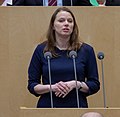Second Senate of Peter Tschentscher Senate Tschentscher II | |
|---|---|
| 30th Senate of Hamburg | |
| 10 June 2020 – 7 May 2025 | |
 | |
| Date formed | 10 June 2020 |
| Date dissolved | 7 May 2025 |
| People and organisations | |
| First Mayor | Peter Tschentscher |
| Second Mayor | Katharina Fegebank |
| No. of ministers | 11 |
| Member parties | Social Democratic Party Alliance 90/The Greens |
| Status in legislature | Majority (Coalition) |
| Opposition parties | Christian Democratic Union The Left Alternative for Germany Free Democratic Party |
| History | |
| Election | 2020 Hamburg state election |
| Legislature term | 22nd Hamburg Parliament |
| Predecessor | First Tschentscher senate |
| Successor | Third Tschentscher senate |
The second Tschentscher senate was the state government of Hamburg from 10 June 2020 to 7 May 2025. Sworn in on 10 June 2020 after Peter Tschentscher was elected as first mayor by the members of the Hamburg Parliament. On 7 May 2025 Peter Tschentscher was reelected first mayor of Hamburg, forming the Third Tschentscher senate. It was the 30th Senate of Hamburg.
Contents
It was formed after the 2020 Hamburg state election by the Social Democratic Party (SPD) and Alliance 90/The Greens (GRÜNE). Excluding the first mayor, the senate comprised 11 ministers, called Senators. Six were members of the SPD, four were members of the Greens, and one was an independent politician.









